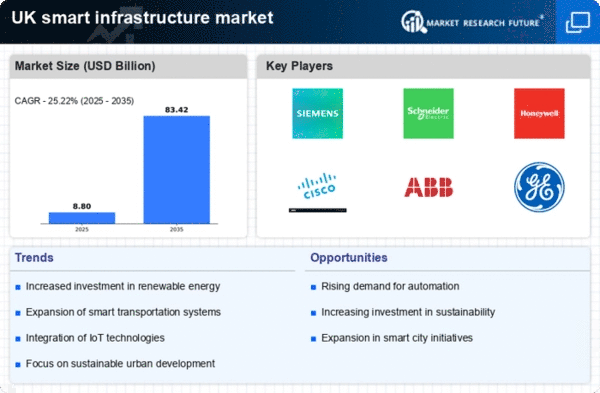Technological Advancements
Rapid advancements in technology are significantly influencing the smart infrastructure market in the UK. Innovations in artificial intelligence, machine learning, and big data analytics are enabling more efficient management of urban resources. For example, the integration of smart sensors and real-time data analytics allows for improved traffic management and energy distribution. According to recent estimates, the smart infrastructure market is projected to grow at a CAGR of 15% from 2025 to 2030, driven by these technological advancements. As cities become more interconnected, the demand for smart infrastructure solutions that enhance operational efficiency and sustainability is likely to increase, further propelling market growth.
Government Initiatives and Funding
The UK government has been actively promoting the development of smart infrastructure through various initiatives and funding programs. This includes investments aimed at enhancing urban mobility, energy efficiency, and digital connectivity. For instance, the National Infrastructure Strategy outlines a commitment to invest £100 billion in infrastructure projects over the next five years, which is likely to bolster the smart infrastructure market. Such government backing not only provides financial support but also encourages private sector participation, fostering innovation and collaboration. The emphasis on smart cities and sustainable development aligns with the broader goals of reducing carbon emissions and improving quality of life, thereby driving growth in the smart infrastructure market.
Urbanization and Population Growth
The ongoing trend of urbanization in the UK is a critical driver for the smart infrastructure market. As more people migrate to urban areas, the demand for efficient public services and infrastructure becomes paramount. The Office for National Statistics projects that the UK population will reach 70 million by 2030, intensifying the need for smart solutions in transportation, waste management, and energy consumption. This urban growth necessitates the implementation of smart infrastructure to manage resources effectively and improve living conditions. Consequently, the smart infrastructure market is expected to expand as cities seek innovative solutions to accommodate their growing populations.
Environmental Regulations and Compliance
Increasing environmental regulations in the UK are shaping the smart infrastructure market. The government has set ambitious targets for reducing greenhouse gas emissions, aiming for a net-zero economy by 2050. Compliance with these regulations necessitates the adoption of smart technologies that enhance energy efficiency and reduce waste. For instance, smart grids and energy management systems are becoming essential for utilities to meet regulatory requirements. The smart infrastructure market is likely to benefit from this regulatory landscape, as companies invest in sustainable technologies to ensure compliance and improve their environmental footprint.
Public Awareness and Demand for Smart Solutions
There is a growing public awareness regarding the benefits of smart infrastructure, which is driving demand for innovative solutions in the UK. Citizens are increasingly recognizing the importance of sustainable living and the role of technology in enhancing urban life. This shift in consumer behavior is prompting local authorities and businesses to invest in smart infrastructure projects that address public concerns about efficiency, safety, and environmental impact. As a result, the smart infrastructure market is likely to see increased investment and development, as stakeholders respond to the demand for smarter, more sustainable urban environments.
















